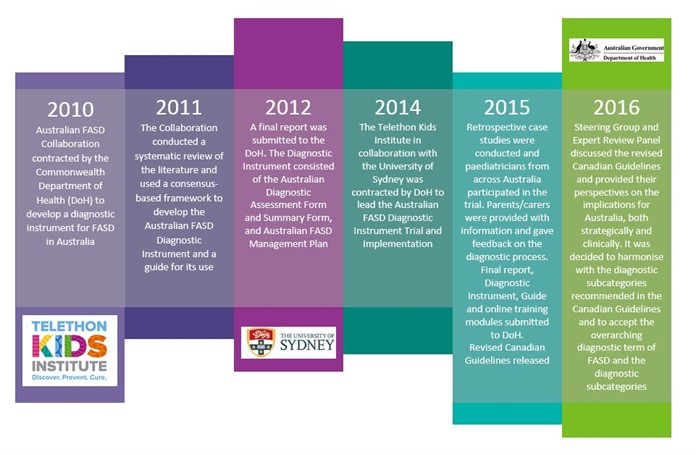Contact us
For general inquiries or for more information about this project, please contact
What did we do?
- Developed an activity implementation plan
- Established a Steering Group and Expert Review Panel to oversee implementation of the project and to provide expert advice on the development and final review of the diagnostic instrument and Guide for its use.
- Completed retrospective case reviews using the draft diagnostic instrument, with members of the Expert Review Panel making recommendations for revisions to the instrument and guidelines prior to the feasibility trial in the clinical environment
- Conducted a feasibility trial with clinicians from a range of settings (metropolitan, regional, rural, remote) to trial the diagnostic instrument across Australia. Parents and guardians of children undergoing diagnostic assessment were also invited to provide feedback on their experience of the diagnostic process and the resources for families.
- Revised the diagnostic instrument and Guidelines based on feedback from the trial and submitted a draft final report to the Commonwealth Department of Health (December 2015).
- Submitted a final report to the Commonweallth Department of Health (April 2016) which harmonised the Australian Instrument with the diagnostic subcategories recommended in the new Canadian Guidelines and accepted the overarching diagnostic term of FASD and the diagnostic subcategories relating to the presence or absence of the three sentinel facial features.
- Developed online training modules to facilitate the national implementation of the diagnostic instrument
In harmony with the new Canadian Guidelines, Fetal Alcohol Spectrum Disorder (FASD) is used in Australia as a diagnosis, which has two sub-categories:
- FASD with three sentinel facial features (similar to the previous diagnostic category of Fetal Alcohol Syndrome)
- FASD with less than three sentinel facial features (which encompasses the previous diagnostic categories of Partial Fetal Alcohol Syndrome and Neurodevelopmental Disorder-Alcohol Exposed)
The availability of the Diagnostic Instrument, the Guide and the on-line training modules to support clinicians to make a FASD diagnosis using the national standardised diagnostic criteria and instrument will provide the foundation to improve rates of diagnoses of FASD in Australia. The resources will promote timeliness and consistency in diagnosis and will help estimate the prevalence of FASD in Australia. This in turn will improve the evidence base for prevention, diagnosis, management and advocacy for improved services and supports.
Australian Guide to the Diagnosis of FASD
Released: 5 May 2016 Updated: 13 May 2016
